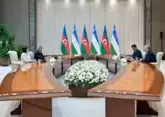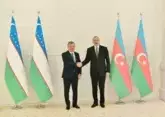In March, Zokirjon Almatov, Uzbekistan’s first minister of interior from 1991-2005, gave his first interview to an independent Uzbek independent, Qalampir. The Diplomat reports in its article The Re-emergence of Uzbekistan’s First Minister of Interior that since Almatov’s return to government, at the beckoning of President Shavkat Mirziyoyev in 2016, his public appearances have been frequent, but this interview is important for two reasons. First, Almatov is the first rehabilitated Karimov-era senior official to speak extensively about his time in government. Second, Almatov is also the first top official to speak about the 2005 Andijan events.
Almatov was called out of retirement, where he’d been for 12 years, soon after Mirziyoyev was inaugurated as president. In December 2016, Almatov reportedly was appointed to the newly created State Anticorruption Commission, but no reports of his activities there followed. In February 2018, Almatov returned to the organization he spent 35 years in to take up a newly created role of an advisor to the current Minister of Interior Polat Bobojonov. Mirziyoyev’s decree on reforms in the police forces adopted in April 2017 encompassing 78 areas also likely contributed to Almatov’s return to the ministry.
In his new role, Almatov seems to be placed far from decision-making and routine matters of the ministry. Since returning to the ministry, he inaugurated a new police office in Namangan, visited police branches around the country, and even toured the country to show support to farmers during the harvesting season.
In the interview, Almatov described the 2005 Andijan events as the most painful in his professional life. He spoke about the unfair reaction of the world community to the way his ministry managed the events in Andijan. “I asked European and U.S. officials what they would have done, they said they would have done the same. No country negotiates with terrorists.” Almatov also touched on the thorniest issue of the Andijan events. Without specifying the exact number of casualties, he stated that the number of people killed were not as many as were reported outside Uzbekistan: “not 1,000, not even 500.” At the same time, he recognized his fault for not foreseeing and preventing such developments in Andijan.
Almatov’s interview was also an effort to humanize him and the Ministry of Interior. Almatov spoke about the period of his leadership in the ministry from 1991 to 2005 as the time of connecting the police with the population and nurturing a family atmosphere among the police force, “I wanted my police officers to imagine their relatives behind a suspect and treat them with respect.” Almatov added that he directed the police to know households in their patrol areas by attending weddings and funerals.
However, journalist Bobomurod Abdullaev’s (published then under nom de plume Usman Haknazarov) description of Almatov in 2003 was far from the flattering portrait Almatov made of himself. According to Abdullaev, Almatov and Rustam Inoyatov, then head of the National Security Service, were main rivals for then-President Islam Karimov’s attention, government resources, power, and talents. Abdullaev also describes an instance in which Almatov allegedly sent 80 police to Karakalpakstan in 1995 to pressure 24 farmers to extort money. In the same article, Almatov is described as connected to two business magnates from Uzbekistan, Salim Abduvaliev and Gafur Rahimov and protecting their businesses. (Interestingly, these two individuals came up during the interview, whom Almatov described as patriots and philanthropists.)
Almatov’s current role in the ministry seems to be to elevate and maintain the reputation of the police while the police forces are undergoing transformations among other law enforcement organizations. He confirmed during the interview that the reputation of the police is being slowly restored following Ministry of Interior’s demise after his departure in 2005. Referring to the post-2005 development in the Ministry of Interior, he confirmed that the purging included numerous high-level sackings and arrests in the ministry and that some police departments, in particular the special forces, were transferred to the National Security Service.
As a previously powerful law enforcement official, Almatov’s return was deemed necessary for the ongoing reforms in the country and in particular for his ministry. By Almatov’s return, the current administration also signals in a sense that his departure was undeserved. The fact that one of the most powerful officials from the 1990s to the mid-2000s has spoken to the media about a previously taboo topic, such as the Andijan events, is a sign of transformation in Uzbekistan. But him continuing with the original government narrative of the events in Andijan reveals the current government’s stand on the matter.










